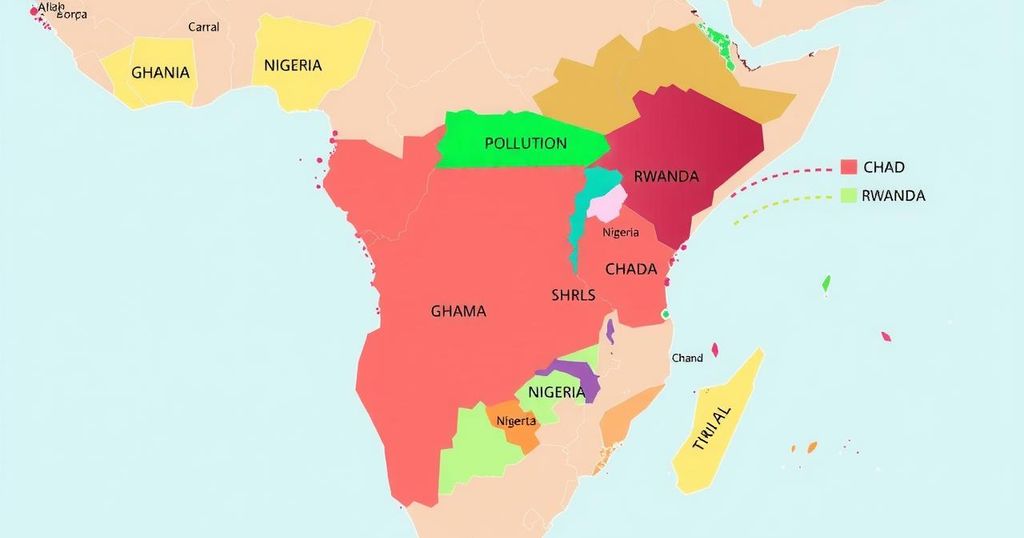Air Quality Crisis: Ghana, Nigeria, Chad, and Rwanda Among Most Polluted Countries

The 2024 World Air Quality Report reveals alarming pollution levels in Africa, with Ghana, Nigeria, Chad, and Rwanda ranking among the world’s most polluted countries. Chad has the worst PM2.5 levels at 91.8 µg/m³, significantly exceeding WHO guidelines. Ghana’s pollution shows a worrying trend, rising to 35.8 µg/m³, with fatal health implications indicating a national crisis that may cost billions economically if unaddressed.
The 2024 World Air Quality Report has highlighted a significant air pollution crisis in Africa, particularly in countries like Ghana, Nigeria, Chad, and Rwanda, which rank among the most polluted globally. Chad leads this list with a shocking PM2.5 concentration of 91.8 µg/m³, starkly exceeding the WHO’s recommended limit of 5 µg/m³. Nigeria and Rwanda also feature prominently, with PM2.5 levels of 40.1 µg/m³ and 40.8 µg/m³ respectively, while Ghana is registered at 35.8 µg/m³, marking it the 14th among polluted countries worldwide.
PM2.5 particles pose severe health risks as they penetrate the lungs and bloodstream, leading to respiratory and cardiovascular issues. Due to their microscopic size, they are notably more dangerous than larger pollutants, being over four times smaller than dust particles. Reports cite that air pollution shortens lifespans by an average of 2.7 years in adversely affected areas; in Ghana alone, air pollution accounts for approximately 28,000 annual deaths, indicating a significant public health crisis.
Ghana’s air quality has drastically deteriorated, showing pollution levels seven times greater than WHO’s safety threshold. Accra is reported as the 16th most polluted capital globally with PM2.5 measuring 36.3 µg/m³, while Kumasi recorded 39.5 µg/m³, surpassing Accra’s pollution levels for the first time. Ghana’s pollution levels have consistently risen from 30.2 µg/m³ in 2022 to 35.8 µg/m³ in 2024.
The report sheds light on the broader issue of air quality in Africa, indicating that five of the top ten most polluted countries are on the continent. Alarmingly, only 24 out of 54 African nations report air quality data, highlighting significant gaps in monitoring infrastructure. Moreover, 34% of African cities suffer PM2.5 levels that exceed WHO guidelines by 3-5 times.
Air pollution is emerging as a public health emergency in Ghana. Statistics reveal a grim reality, with one person dying every 19 minutes due to poor air quality. If current trends continue, monthly fatalities could exceed 2,333. The economic impact is also severe, with reports estimating possible costs of $137.8 billion to Ghana’s economy by 2040 without immediate corrective measures.
On a global scale, the report reveals that a mere 17% of cities worldwide meet WHO air quality standards. Countries such as Chad, Bangladesh, and Pakistan top the list of the most polluted nations, while select countries like Australia and New Zealand are noted for maintaining cleaner air.
Key drivers of air pollution in Africa include rapid urbanization, population growth, unchecked industrial emissions, and waste burning. Monitoring efforts are largely supported by NGOs, now providing 67% of air quality data, stressing the need for improved governmental oversight.
In light of these urgent concerns, experts advocate for stricter environmental regulations in Ghana. Recommended actions include enhanced vehicle emission controls, increased investment in renewable energy, more comprehensive air quality monitoring, and strict regulations against burning waste. With the rising pollution levels, proactive efforts are essential to mitigate this crisis and protect public health.
The 2024 World Air Quality Report marks a critical point in understanding air pollution in Africa, particularly noting that Ghana, Nigeria, Chad, and Rwanda rank among the most polluted countries. With rising PM2.5 levels posing severe health risks, experts emphasize the necessity for immediate action. Strengthening environmental regulations, monitoring efforts, and transitioning to renewable energy are vital steps required to address this escalating public health crisis.
Original Source: www.myjoyonline.com







